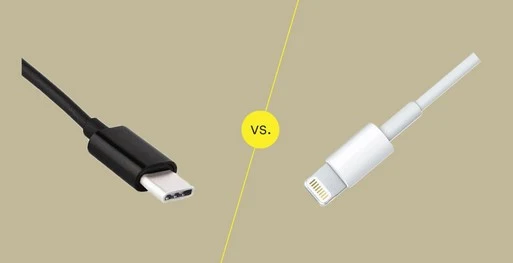In the past, each of our electronic devices had its own charging / interface cable. Sometimes, these cables could be used with other devices. But most of the time, these cables could only be used with the devices they came with.
Manufacturers (and lately regulators) saw this to be a problem, and developed common standards. USB-A became a standard to connect devices to PCs and Charging Blocks. However, when it came to connecting Cell Phones and Tablets to PCs and Charging Blocks, things changed a little more slowly. And this is where the "fun" begins.
Over the years, most device manufacturers have seen the need for a universal cable type, and came up with USB-C. Given all the headaches needed to implement this type of connection, I understand that it is almost a miracle this could be done with USB-C. Yet, it is the wired connection type that all non-Apple manufacturers are making their standard.
Apple is well known for not playing well in the sandbox. It creates proprietary standards, used in a way to prevent many non-Apple devices from connecting to Apple tablets and cell phones. Recently, the European Union pressed Apple to use USB-C, and Apple tried to resist the EU. However, it looks like Apple has caved into pressure (sort of). Like what they have done with Bluetooth and Wi-Fi wireless connections, they want their USB-C implementation to exclude non Apple devices.
Now, I respect Apple for doing what it does well. (I own an iPad which was given to me as a gift, and am surprised that it still runs well after 8+ years of ownership.) But I detest Apple for making it impossible to tether my iPad to my Android phone or for making it impossible for my friend to tether her non-Apple laptop to her iPhone to the cellular phone network.
In fairness, IBM once played the same game with its equipment that Apple now plays with standards. And look where IBM is now with its manufacturing. They legitimized the personal computer industry, and now has no interest in it. Apple has done something that no technology vendor has done since the age of mainframe computers - it has developed a fully integrated technology ecosystem. But this may be its eventual undoing. IBM was forced to play nice in the sandbox by the courts. Apple is being forced to play nice in the sandbox by the EU.
How long can Apple last before the next major technological shift? And what type of shift will that be? I have no way to see the future. But this pattern has played itself out again and again with modern technology. The character set used by IBM mainframes is directly related to the punch card codes used in the 1890 census. More recently, both MS-Word and Lotus 123 created de-facto standards for Word Processing and Spreadsheets.
The big question is: What will Apple have contributed as part of its legacy?





